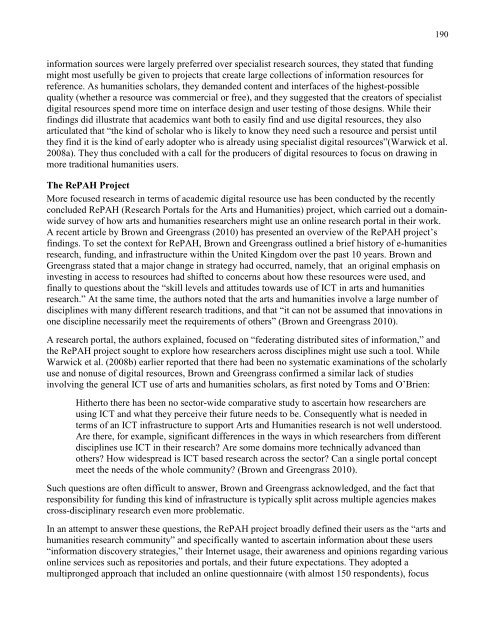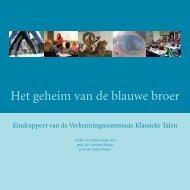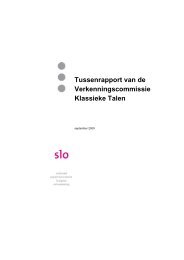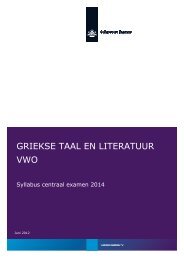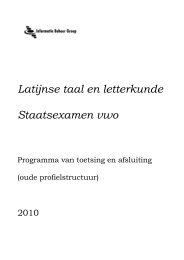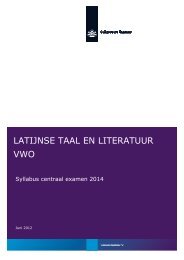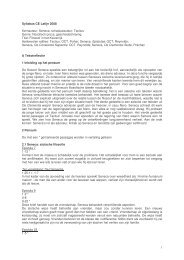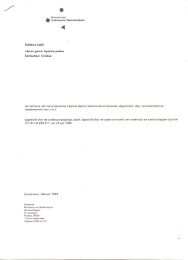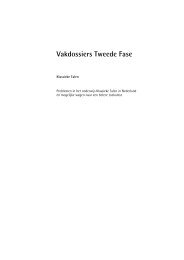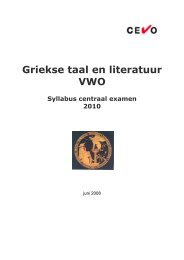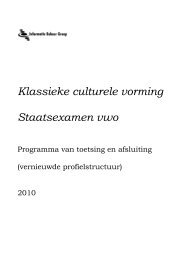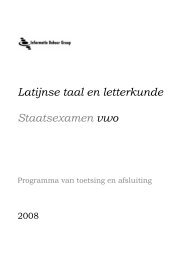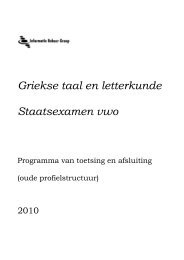Rome Wasn't Digitized in a Day - Council on Library and Information ...
Rome Wasn't Digitized in a Day - Council on Library and Information ...
Rome Wasn't Digitized in a Day - Council on Library and Information ...
Create successful ePaper yourself
Turn your PDF publications into a flip-book with our unique Google optimized e-Paper software.
190<br />
<str<strong>on</strong>g>in</str<strong>on</strong>g>formati<strong>on</strong> sources were largely preferred over specialist research sources, they stated that fund<str<strong>on</strong>g>in</str<strong>on</strong>g>g<br />
might most usefully be given to projects that create large collecti<strong>on</strong>s of <str<strong>on</strong>g>in</str<strong>on</strong>g>formati<strong>on</strong> resources for<br />
reference. As humanities scholars, they dem<strong>and</strong>ed c<strong>on</strong>tent <strong>and</strong> <str<strong>on</strong>g>in</str<strong>on</strong>g>terfaces of the highest-possible<br />
quality (whether a resource was commercial or free), <strong>and</strong> they suggested that the creators of specialist<br />
digital resources spend more time <strong>on</strong> <str<strong>on</strong>g>in</str<strong>on</strong>g>terface design <strong>and</strong> user test<str<strong>on</strong>g>in</str<strong>on</strong>g>g of those designs. While their<br />
f<str<strong>on</strong>g>in</str<strong>on</strong>g>d<str<strong>on</strong>g>in</str<strong>on</strong>g>gs did illustrate that academics want both to easily f<str<strong>on</strong>g>in</str<strong>on</strong>g>d <strong>and</strong> use digital resources, they also<br />
articulated that “the k<str<strong>on</strong>g>in</str<strong>on</strong>g>d of scholar who is likely to know they need such a resource <strong>and</strong> persist until<br />
they f<str<strong>on</strong>g>in</str<strong>on</strong>g>d it is the k<str<strong>on</strong>g>in</str<strong>on</strong>g>d of early adopter who is already us<str<strong>on</strong>g>in</str<strong>on</strong>g>g specialist digital resources”(Warwick et al.<br />
2008a). They thus c<strong>on</strong>cluded with a call for the producers of digital resources to focus <strong>on</strong> draw<str<strong>on</strong>g>in</str<strong>on</strong>g>g <str<strong>on</strong>g>in</str<strong>on</strong>g><br />
more traditi<strong>on</strong>al humanities users.<br />
The RePAH Project<br />
More focused research <str<strong>on</strong>g>in</str<strong>on</strong>g> terms of academic digital resource use has been c<strong>on</strong>ducted by the recently<br />
c<strong>on</strong>cluded RePAH (Research Portals for the Arts <strong>and</strong> Humanities) project, which carried out a doma<str<strong>on</strong>g>in</str<strong>on</strong>g>wide<br />
survey of how arts <strong>and</strong> humanities researchers might use an <strong>on</strong>l<str<strong>on</strong>g>in</str<strong>on</strong>g>e research portal <str<strong>on</strong>g>in</str<strong>on</strong>g> their work.<br />
A recent article by Brown <strong>and</strong> Greengrass (2010) has presented an overview of the RePAH project’s<br />
f<str<strong>on</strong>g>in</str<strong>on</strong>g>d<str<strong>on</strong>g>in</str<strong>on</strong>g>gs. To set the c<strong>on</strong>text for RePAH, Brown <strong>and</strong> Greengrass outl<str<strong>on</strong>g>in</str<strong>on</strong>g>ed a brief history of e-humanities<br />
research, fund<str<strong>on</strong>g>in</str<strong>on</strong>g>g, <strong>and</strong> <str<strong>on</strong>g>in</str<strong>on</strong>g>frastructure with<str<strong>on</strong>g>in</str<strong>on</strong>g> the United K<str<strong>on</strong>g>in</str<strong>on</strong>g>gdom over the past 10 years. Brown <strong>and</strong><br />
Greengrass stated that a major change <str<strong>on</strong>g>in</str<strong>on</strong>g> strategy had occurred, namely, that an orig<str<strong>on</strong>g>in</str<strong>on</strong>g>al emphasis <strong>on</strong><br />
<str<strong>on</strong>g>in</str<strong>on</strong>g>vest<str<strong>on</strong>g>in</str<strong>on</strong>g>g <str<strong>on</strong>g>in</str<strong>on</strong>g> access to resources had shifted to c<strong>on</strong>cerns about how these resources were used, <strong>and</strong><br />
f<str<strong>on</strong>g>in</str<strong>on</strong>g>ally to questi<strong>on</strong>s about the “skill levels <strong>and</strong> attitudes towards use of ICT <str<strong>on</strong>g>in</str<strong>on</strong>g> arts <strong>and</strong> humanities<br />
research.” At the same time, the authors noted that the arts <strong>and</strong> humanities <str<strong>on</strong>g>in</str<strong>on</strong>g>volve a large number of<br />
discipl<str<strong>on</strong>g>in</str<strong>on</strong>g>es with many different research traditi<strong>on</strong>s, <strong>and</strong> that “it can not be assumed that <str<strong>on</strong>g>in</str<strong>on</strong>g>novati<strong>on</strong>s <str<strong>on</strong>g>in</str<strong>on</strong>g><br />
<strong>on</strong>e discipl<str<strong>on</strong>g>in</str<strong>on</strong>g>e necessarily meet the requirements of others” (Brown <strong>and</strong> Greengrass 2010).<br />
A research portal, the authors expla<str<strong>on</strong>g>in</str<strong>on</strong>g>ed, focused <strong>on</strong> “federat<str<strong>on</strong>g>in</str<strong>on</strong>g>g distributed sites of <str<strong>on</strong>g>in</str<strong>on</strong>g>formati<strong>on</strong>,” <strong>and</strong><br />
the RePAH project sought to explore how researchers across discipl<str<strong>on</strong>g>in</str<strong>on</strong>g>es might use such a tool. While<br />
Warwick et al. (2008b) earlier reported that there had been no systematic exam<str<strong>on</strong>g>in</str<strong>on</strong>g>ati<strong>on</strong>s of the scholarly<br />
use <strong>and</strong> n<strong>on</strong>use of digital resources, Brown <strong>and</strong> Greengrass c<strong>on</strong>firmed a similar lack of studies<br />
<str<strong>on</strong>g>in</str<strong>on</strong>g>volv<str<strong>on</strong>g>in</str<strong>on</strong>g>g the general ICT use of arts <strong>and</strong> humanities scholars, as first noted by Toms <strong>and</strong> O’Brien:<br />
Hitherto there has been no sector-wide comparative study to ascerta<str<strong>on</strong>g>in</str<strong>on</strong>g> how researchers are<br />
us<str<strong>on</strong>g>in</str<strong>on</strong>g>g ICT <strong>and</strong> what they perceive their future needs to be. C<strong>on</strong>sequently what is needed <str<strong>on</strong>g>in</str<strong>on</strong>g><br />
terms of an ICT <str<strong>on</strong>g>in</str<strong>on</strong>g>frastructure to support Arts <strong>and</strong> Humanities research is not well understood.<br />
Are there, for example, significant differences <str<strong>on</strong>g>in</str<strong>on</strong>g> the ways <str<strong>on</strong>g>in</str<strong>on</strong>g> which researchers from different<br />
discipl<str<strong>on</strong>g>in</str<strong>on</strong>g>es use ICT <str<strong>on</strong>g>in</str<strong>on</strong>g> their research Are some doma<str<strong>on</strong>g>in</str<strong>on</strong>g>s more technically advanced than<br />
others How widespread is ICT based research across the sector Can a s<str<strong>on</strong>g>in</str<strong>on</strong>g>gle portal c<strong>on</strong>cept<br />
meet the needs of the whole community (Brown <strong>and</strong> Greengrass 2010).<br />
Such questi<strong>on</strong>s are often difficult to answer, Brown <strong>and</strong> Greengrass acknowledged, <strong>and</strong> the fact that<br />
resp<strong>on</strong>sibility for fund<str<strong>on</strong>g>in</str<strong>on</strong>g>g this k<str<strong>on</strong>g>in</str<strong>on</strong>g>d of <str<strong>on</strong>g>in</str<strong>on</strong>g>frastructure is typically split across multiple agencies makes<br />
cross-discipl<str<strong>on</strong>g>in</str<strong>on</strong>g>ary research even more problematic.<br />
In an attempt to answer these questi<strong>on</strong>s, the RePAH project broadly def<str<strong>on</strong>g>in</str<strong>on</strong>g>ed their users as the “arts <strong>and</strong><br />
humanities research community” <strong>and</strong> specifically wanted to ascerta<str<strong>on</strong>g>in</str<strong>on</strong>g> <str<strong>on</strong>g>in</str<strong>on</strong>g>formati<strong>on</strong> about these users<br />
“<str<strong>on</strong>g>in</str<strong>on</strong>g>formati<strong>on</strong> discovery strategies,” their Internet usage, their awareness <strong>and</strong> op<str<strong>on</strong>g>in</str<strong>on</strong>g>i<strong>on</strong>s regard<str<strong>on</strong>g>in</str<strong>on</strong>g>g various<br />
<strong>on</strong>l<str<strong>on</strong>g>in</str<strong>on</strong>g>e services such as repositories <strong>and</strong> portals, <strong>and</strong> their future expectati<strong>on</strong>s. They adopted a<br />
multipr<strong>on</strong>ged approach that <str<strong>on</strong>g>in</str<strong>on</strong>g>cluded an <strong>on</strong>l<str<strong>on</strong>g>in</str<strong>on</strong>g>e questi<strong>on</strong>naire (with almost 150 resp<strong>on</strong>dents), focus


